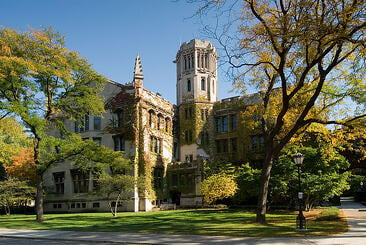The National Institutes of Health (NIH) recently launched a new network of institutions - called the Centers for Common Disease Genomics (CCDG) - which will study common conditions such as heart disease, stroke, diabetes, and autism to see how genetics and DNA contribute to the risk of these diseases. The McDonnell Genome Institute at Washington University in St. Louis is one of four institutions involved in this network and will be receiving $60 million over the next four years to study genomics and common diseases.
Read MoreRecent Posts
Tags: Washington University St. Louis, Midwest, Missouri, WashU, heart disease, Diabetes, Autism, BioResearch Product Faire Event, MO, St Louis, NIH funding, 2016, Centers for Common Disease Genomics, stroke, CCDG

There are numerous different types of cancers that affect people around the world. According to the National Cancer Institute, national expenditures for cancer research could exceed $156 billion by 2020, making it one of the most expensive, well-funded research topics around the world. The University of Chicago is one of the many institutions committed to cancer research, with a Comprehensive Cancer Center housing more than 210 researchers and clinicians.
Read MoreTags: Midwest, University of Chicago, cancer research, BioResearch Product Faire Event, Chicago, IL, UChicago, 2016, Hospira Foundation
 One in eight couples in the United States has fertility problems. In the majority of infertility cases, the cause can be pinpointed to either the man or the woman, but sometimes there seems to be no explanation for the cause of infertility. Researchers at Rutgers University in New Brunswick, New Jersey studying infertility in roundworms have recently found a link between humans and roundworms that provides insight into human infertility.
One in eight couples in the United States has fertility problems. In the majority of infertility cases, the cause can be pinpointed to either the man or the woman, but sometimes there seems to be no explanation for the cause of infertility. Researchers at Rutgers University in New Brunswick, New Jersey studying infertility in roundworms have recently found a link between humans and roundworms that provides insight into human infertility.
Tags: Northeast, NJ, New Jersey, Rutgers University, BioResearch Product Faire Event, BRPF, Rutgers, Male infertility, 2016, SPE-45, Roundworms, Izumo protein

Updated 12/8/2016, originally posted by Laura Braden 2/2/16
Understanding what stem cells do and why they are important has been a popular research topic for many years. Scientists have learned quite a bit about their functions, such as repairing damaged tissues and renewing some normal ones. However, there is no knowledge of where these stem cells originate and how they develop in the embryo.
Read MoreTags: Rockefeller University, Northeast, Stem Cells, New York, RockU, NY, 2016, BioResearch Product Faire

Tuberculosis is the number one cause of death by infectious disease around the world. In 2014, this contagious bacterial infection was responsible for 1.5 million deaths worldwide. Although the disease is treatable and curable, it still persists as a global health problem that scientists continue to study, to develop new and improved treatments.
The Bill & Melinda Gates Foundation recently granted scientists from the Oregon Health and Science University $3 million to research potential vaccines for tuberculosis.
Read MoreTags: The Bill and Melinda Gates Foundation, tuberculosis, Oregon Health and Science University, Northwest, OR, OHSU, Portland, new funding, 2016, BioResearch Product Faire, MAIT cells
 As people get older, their bodies become more susceptible to certain diseases. Cancer, among others, is a disease that becomes more common as people age. David S. Yu, M.D., Ph.D from Emory University was recently awarded $1.6 million from the National Institutes of Health (NIH) to study the gene SIRT2 and how it can be manipulated to control the effects of aging and prevent cancer.
As people get older, their bodies become more susceptible to certain diseases. Cancer, among others, is a disease that becomes more common as people age. David S. Yu, M.D., Ph.D from Emory University was recently awarded $1.6 million from the National Institutes of Health (NIH) to study the gene SIRT2 and how it can be manipulated to control the effects of aging and prevent cancer.
Tags: Emory University, Aging, cancer research, Southern, Emory, Atlanta, GA, 2016, BioResearch Product Faire
 When vital organs in the body, such as the lungs, begin to fail, an organ transplant can be a solution to the problem. However, receiving a transplant may have its own complications, such as the body rejecting its new organ.
When vital organs in the body, such as the lungs, begin to fail, an organ transplant can be a solution to the problem. However, receiving a transplant may have its own complications, such as the body rejecting its new organ.
Now, thanks to a generous donation of $1 million dollars from Michael and Linda Keston, researchers from the Division of Pulmonary and Critical Care Medicine at the UCLA David Geffen School of Medicine will be able to continue studying lung disease and the organ rejection commonly following a transplant.
Read MoreTags: CA, University of California Los Angeles, Los Angeles, LAVS, UCLA, Biotechnology Vendor Showcase, new funding, 2016, Lung Disease, organ transplant, organ rejection

Multiple myeloma is a rare form of cancer that affects the immune system in about 0.7% of Americans. According to the American Cancer Society, approximately 26,850 new cases were expected to be diagnosed in 2015, and 11,240 deaths were expected to occur. Although there are treatments available to fight this cancer, patients frequently relapse, demonstrating the need for new treatments.
Read MoreTags: Washington University St. Louis, Midwest, WashU, St. Louis Bioresearch Product Faire Event, cancer research, Cancer Treatment, MO, St Louis, new funding, 2016, BioResearch Product Faire, Multiple Myeloma
 Since HIV/AIDS emerged as a global health problem in the 1980's, researchers have been diligently working to create new treatments and vaccines for the disease. Currently, there is no cure for the disease, and treatments can only suppress it. Because of its severity and broad reach, scientists around the world receive substantial funding each year to study this virus in order to gain a more thorough understanding and better combat it. Now, thanks to an award from the Foundation for AIDS Research (amfAR), researchers at the University of California, San Francisco will be able to study the virus in a new $20 million institute, located on the Mission Bay campus, for the next five years.
Since HIV/AIDS emerged as a global health problem in the 1980's, researchers have been diligently working to create new treatments and vaccines for the disease. Currently, there is no cure for the disease, and treatments can only suppress it. Because of its severity and broad reach, scientists around the world receive substantial funding each year to study this virus in order to gain a more thorough understanding and better combat it. Now, thanks to an award from the Foundation for AIDS Research (amfAR), researchers at the University of California, San Francisco will be able to study the virus in a new $20 million institute, located on the Mission Bay campus, for the next five years. Tags: CA, University of California San Francisco, HIV, AIDS Research, Southwest, San Francisco, SFVS, Biotechnology Vendor Showcase, UCSF, UCSF Mission Bay, New research center, 2016


 Parkinson's Disease is a devastating neurodegenerative disease that affects people's motor functions. As of today, there are no cures for Parkinson's Disease, and treatments are only able to alleviate symptoms. Researchers across the nation are heavily studying the disease, with the goal of learning more about the onset and progress of the disease to help scientists develop treatment methods.
Parkinson's Disease is a devastating neurodegenerative disease that affects people's motor functions. As of today, there are no cures for Parkinson's Disease, and treatments are only able to alleviate symptoms. Researchers across the nation are heavily studying the disease, with the goal of learning more about the onset and progress of the disease to help scientists develop treatment methods.